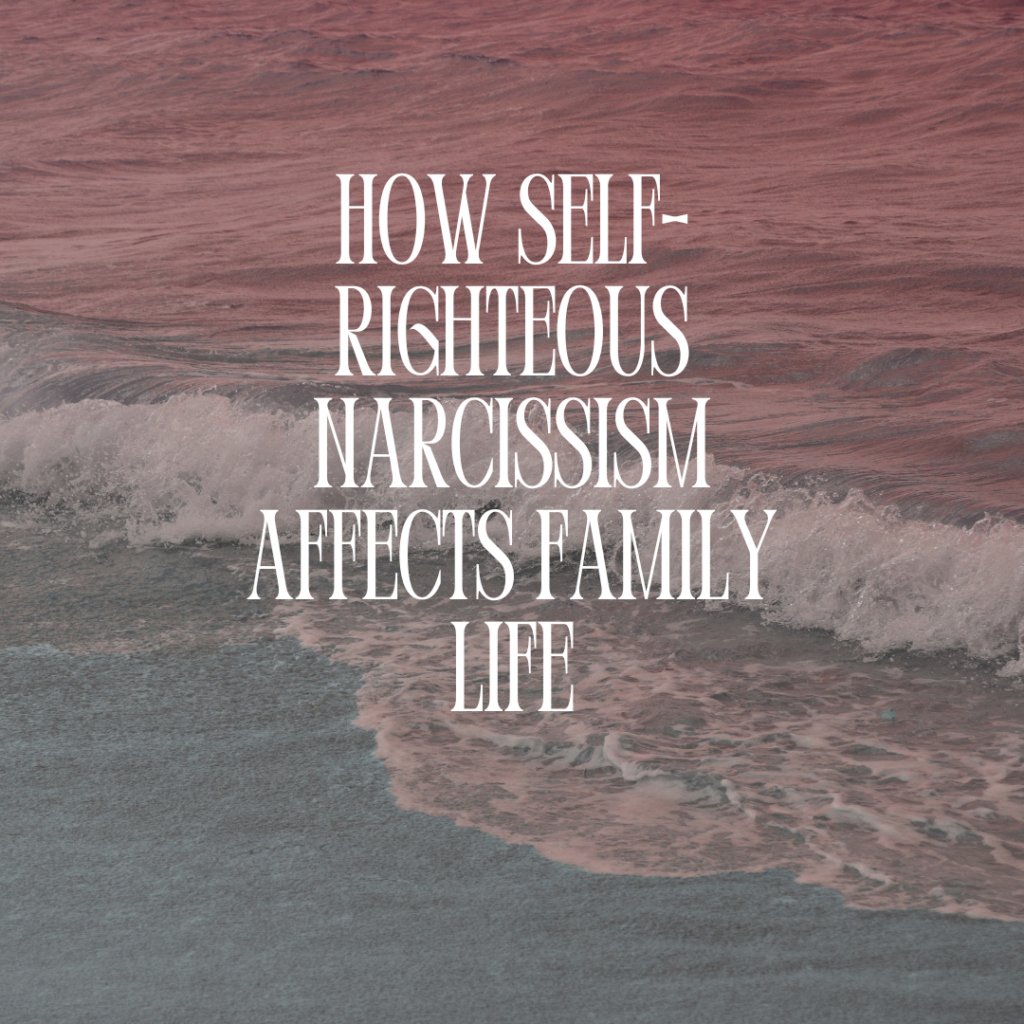After learning about narcissism several years ago, I have continued my pursuit of understanding narcissism’s influence on personal relationships and parenting, which has led me to see and learn about different aspects of this complex personality disorder. I recently read the book “If Only I’d Known,” by Chelsey Brooke Cole. The book talks about narcissists in general, but it also breaks down the different types of narcissists, how they relate to people, and how they go through different phases of narcissistic abuse. I had learned about spiritual narcissists in the past, but she referred to them as “Self-Righteous Narcissists.” This specific subtype of narcissism resonated with me because it reflected patterns I recognized in my marriage.

Detailed Exploration of Self-Righteous Narcissism
At the core of self-righteous narcissism is an intense belief in one’s moral superiority, a trait that significantly influences their interactions and worldview. This belief extends far beyond simple arrogance; it forms a fundamental part of their identity, shaping how they perceive themselves and others.
A big part of this personality type is their judgmental attitude. Self-righteous narcissists often critique others’ choices in various aspects of life, such as parenting, career decisions, or leisure activities. For example, they might look down on someone choosing a career in the arts, seeing it as less valuable or respectable compared to careers they see as more morally or intellectually worthy. Their judgment is not limited to big decisions; it rolls into everyday choices, like criticizing a neighbor’s lawn care as ‘neglectful’ or ‘irresponsible,’ positioning their own choices as superior to others.
Their lack of empathy is another defining trait, not just in an emotional sense but also intellectually. They struggle to acknowledge or respect others’ life experiences and perspectives that differ from their own. This rigid moral framework often leads them to dismiss or invalidate the feelings and thoughts of others. This could be something like disregarding a friend’s emotional distress over a job loss or criticizing a friend’s career path instead of offering support.
Inflexibility is a characteristic of narcissistic relationships, but self-righteous narcissists may refuse to participate in activities or events that don’t align with their strict moral code. This inflexibility can strain relationships, as they might not attend a family wedding because they disapprove of the couple living together before marriage, or they might refuse to celebrate a holiday they find ‘commercial’ or ‘superficial.’
A narcissist’s need for validation is typical for them and challenging for those around them. They not only want agreement with their viewpoints but also admiration for their supposed moral stance. This need can be seen in various ways, from seeking constant praise for their ‘ethical’ lifestyle choices to becoming argumentative or short-tempered if people challenge or fail to acknowledge their moral superiority. For example, they might expect constant recognition for their charitable donations or environmentally friendly habits and react negatively if they feel their efforts need to be sufficiently acknowledged.
Self-righteous narcissists’ interactions are colored by their unwavering belief in their moral superiority, impacting their relationships and often leading to conflict and misunderstanding. Their judgmental attitude, lack of empathy, inflexibility, and need for validation strain their relationships and create a challenging environment for those around them.

In-Depth Real-Life Scenarios of Self-Righteous Narcissism
In personal relationships, the effects of a self-righteous narcissist can be extreme and often disturbing. A self-righteous narcissist may engage in moral policing regarding lifestyle choices, such as not liking your choice of friends, hobbies, or even career, mentioning moral objections for their reason for the disapproval. They also might belittle what you watch on TV or the type of music you listen to, saying they are ‘morally corrupting.’ This type of control extends to many different parts of your life, where the narcissist places their moral compass as the ultimate guide, often leading to tension and conflict.
Financial control is another area where self-righteous narcissists use their authority. They may scrutinize and challenge all household expenditures, judging which purchases are ‘unnecessary’ or ‘immoral.’ This control can create restrictions or closely monitor your spending, a tactic they often justify as enforcing their moral standards. This behavior can create a suffocating and manipulative environment where financial decisions become moral judgments rather than practical choices.
This is something that went on in my marriage. In his mind, I never did anything right regarding money or spending; heck, there were times that even what I bought at the grocery store was scrutinized. Yet, on the other side, he could do and buy what he wanted, when he wanted, all with the understanding that “he knew best.”
In parenting, the self-righteous narcissist’s influence can be just as damaging. They may use academic and extracurricular control over their children, criticizing them for not choosing subjects or activities that go with what they see as intellectually or morally superior. For example, a child’s preference for art over science might be met with disdain and labeled as a ‘waste of potential’ by the parent. This pressure can stifle a child’s natural interests and talents, leading to a strained parent-child relationship and impacting the child’s self-esteem and identity development.
Self-righteous narcissists may engage in what can be described as ‘social engineering’ with their children. They go to great lengths to control who their child interacts with, making decisions based on their moral judgments. This might involve forbidding the child from associating with certain peers or participating in different social activities, justified as protecting the child from ‘immoral influences.’ Such control can isolate the child from different experiences and viewpoints, limiting their social development and ability to form independent thoughts and relationships.
When it comes to ethical discussions, especially those involving social or political issues, the behavior of a self-righteous narcissist can be extremely dominating and confrontational. They often engage in these conversations with a sense of unwavering certainty in their moral correctness. This attitude can be seen as an aggressive criticism of any opinions that don’t go along with theirs. For example, during a discussion about environmental policies, a self-righteous narcissist might not only advocate for their stance but also strongly criticize any different viewpoints as unethical or ignorant. They tend to use moral absolutism, a tactic that disagrees and dismisses any perspectives other than their own. This tactic creates an unpleasant environment in discussions, where open dialogue and exchange of ideas are hidden under the weight of their moral righteousness.
Self-righteous narcissists often put strict standards in the household, which they claim as necessary for ‘moral discipline.’ This can include requiring strict daily routines, like adhering to specific mealtimes or an inflexible schedule for household chores. They might insist that dinner be at exactly 6 PM every day or that certain chores be done in a specific way. These rules are often non-negotiable and leave little room for flexibility or individual preferences. Under the appearance of morality, such strict obedience to routines and standards can create a controlled and restrictive home environment. Family members may feel they are constantly walking on eggshells, trying to adhere to these demanding standards to avoid criticism or moral judgment.
My Personal Reflection
Revisiting my past through the lens of Cole’s insights on self-righteous narcissism, I realized the extent of its impact on my life and family. The constant moral policing, the emotional and intellectual rigidity, and the unyielding need for moral conformity were all too familiar. Having a clearer picture and understanding has been key in processing my past and protecting my family’s emotional health.

How Self-Righteous Narcissism Affects Family Life
Living with someone who thinks they are always right about what’s good and evil can be challenging, especially for a family. This kind of person can make a home feel like a place where you’re constantly being judged, and you have to always do what they say. This can make it hard for everyone in the family to be themselves and feel safe and happy. Kids might grow up feeling like they always have to please this person to be loved, which can make them feel bad about themselves. Partners might feel like they can’t do anything right and are always trying to avoid criticism.
Ways to Handle Living with a Self-Righteous Narcissist
Dealing with a person who always thinks they’re morally right takes strategy. The most important thing to do is to set clear boundaries. This means you must be firm about what you will and won’t accept from them. For instance, you might decide that you have the right to choose your own friends or how you spend your money and stick to that decision even if they try to make you feel guilty.
Finding people who get what you’re going through can also really help. This could be friends, family, a support group, or a counselor or coach. These people can support you, make you feel less alone, and offer good advice on dealing with challenging situations.
Learning more about this kind of behavior and looking after yourself is so important. Understanding more about why they act this way can help you handle things better.
Conclusion
Coming to grips with self-righteous narcissism is a challenging process that doesn’t happen overnight. It’s a journey that involves a lot of learning and patience. Understanding this kind of behavior is important, not just for our peace of mind but also for keeping our families safe and healthy.
Dealing with someone who always thinks they’re morally right can be challenging, especially since their behavior affects everyone around them, including children. We need to learn how to handle these situations in a way that keeps us strong and confident. This means finding ways to stand up for ourselves and not letting the narcissist’s judgments and demands shake our sense of self-worth.
Building resilience and empowerment helps us manage these tricky relationships more effectively. It’s not just about avoiding conflict; it’s about making sure we and our kids stay emotionally healthy and happy, even when dealing with such challenging behavior. Ensuring our well-being and that of our children in the midst of these difficult relationships is a priority, and it requires both strength and understanding.



Hello.
I need to know if this righteous narcissists are morally superior, then they don’t cheat on you and triangle you with other víctims (supplies)?